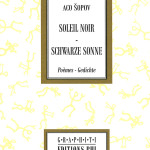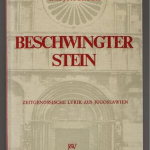This post is also available in: Macedonian French Spanish German Russian Slovenian Croatian Bosnian Albanian
Ina Jun-Broda (Austria-Croatia)
 Ina Jun-Broda (Pseud. Jana Joan, Giula Weiner), austro-croatian poet and translator was born in Zagreb, on 18. 4. 1899. She past away in Vienna, on 16. 8. 1983.
Ina Jun-Broda (Pseud. Jana Joan, Giula Weiner), austro-croatian poet and translator was born in Zagreb, on 18. 4. 1899. She past away in Vienna, on 16. 8. 1983.
In the late seventies of the XX cetnury, she translated in German an important volume of Aco Šopov’s poetry, but for health reasons, she cou not publish it. The poems remained in Aco Šopov’s home for many years, before being partly published in 2012, in a bilingual French-German edition in Luxemburg: Soleil noir – Schwarze Sonne.
Ina Jun-Broda was a leader of the left-wing women’s organization and after the Nazi invasion fled to Dalmatia, where she joined the partisans. Much of her work reflects her experiences during World War II: her collection of poems Der Dichter in der Barbarei (1950) contains sensitive but powerful verse inspired by her life in the occupation period and after; and Die schwarze Erde, is an anthology of Yugoslav partisan poetry that she translated and published in 1958.
 After the war, she worked for the UN is Zagreb and in she settled in Vienna, and thereafter published poems, essays, and German translations mostly from Serbo-Croatian, Macedonian and Italian.
After the war, she worked for the UN is Zagreb and in she settled in Vienna, and thereafter published poems, essays, and German translations mostly from Serbo-Croatian, Macedonian and Italian.
She is the author of the first Serbo-Croatian selection of Bertolt Brecht’s poems, Pjesme, in 1961.
She also produced a German version of Krleza’s Balladen des Peter Kerempuch and commented on Croatian poetry in her Die aelteste kroatische Dichtung, Zagreb, 1972.
In 1976, she published an anthology of Yugoslav poetry entitled Beschwingter Stein (Wien ; München : Jugend und Volk, 139 p.)

